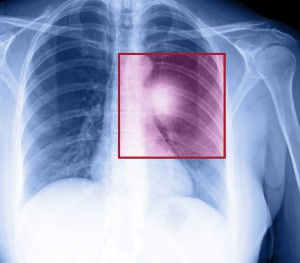
Lung Cancer is the second most common cancer in the United States in both men and women, and is the number one cancer killer. It is responsible for over 150,000 cancer deaths each year. Lung cancer develops from normal cells that form the lung lining. Like most adult cancers, the chance of getting lung cancer increases with age.
The most common risk factor is cigarettes. Cigarette smokers have 20 times the risk of getting lung cancer compared to non-smokers. Other causes include second-hand smoke, asbestos, coal dust, and radon gas. People with no history of toxic exposures occasionally get lung cancer, but most cases are caused by toxic exposure- mainly to cigarette smoke.
Individuals may get early stage or more advanced stage lung cancer. Early stages including stages I and II are small tumors that have not spread very far. Intermediate stage III has spread further, and advanced stage IV has spread to another part of the body such as liver, adrenal glands, or bone. Metastatic is another term for Stage IV cancer, which has spread to another part of the body. Earlier stages are more treatable and carry a better prognosis.
Symptoms of lung cancer include coughing up blood, chest pain, or pneumonia that keeps coming back. More advanced lung cancers cause loss of appetite, weight loss, and pain in the bones.
Someone with symptoms has a CT scan, PET scan, and biopsy to diagnose lung cancer. The biopsy is done by passing a fiberoptic scope down the airway, or by using a needle to penetrate the chest wall. A CAT scanner is used to guide the needle to the tumor.
There are two main types- small cell and non-small cell lung cancer. These types look different under the microscope, progress differently, and are treated differently.
Doctors may prescribe a combination of surgery, radiation, and medicine (chemotherapy) to treat the cancer. Earlier stages are generally more curable. No treatment is recommended if the prognosis is poor or the patient is too weak. In these cases, patients are given medicine to help keep them comfortable.
Medical science has developed “magic bullets” for lung cancer. Magic bullets are drugs that have fewer side effects because they target the cancer cells, sparing other cells. The original magic bullet Iressa is being replaced by Tarceva, a newer drug that works better. Many patients unfortunately cannot afford the $1,600 per month for this medicine. Many insurance policies, including Medicare, don’t pay for these pills, although they pay for chemotherapy given at a doctor’s office. This is one problem that needs to be fixed in our healthcare system.
Screening tests for some cancers- such as mammograms for breast cancer- do save lives. Screening tests are tests given to large numbers of people who don’t have symptoms, to identify early stages of cancer. For lung cancer, screening is not the standard of care, even in smokers, but recent studies with CAT scans look promising.

